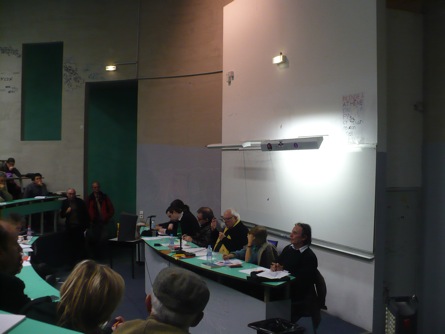I just got home from a great panel on “Re-Creating Universities Through Critical Ethnography” at the Society for Cultural Anthropology Meetings. It was organized by Davydd Greenwood, who was my teacher in college and has been working on anthropology of higher education for longer than I’ve been an academic. We also had Susan Wright, who’s worked on European higher education reforms since the 1990s, and Wes Shumar, who became a prominent critic of commodified higher education with College for Sale.
Davydd is known best for doing participatory action research, so naturally we wanted to devote half of the panel time to working collaboratively with the audience. We planned to ask them questions like these:
- How do we bring about change in the university when so many of us are deeply committed to the hierarchies and the elitism in the current systems of higher education? (Especially as neoliberalism pressures us to be more individualistic and more competitive.)
- Let’s be utopian: What kind of higher education do we truly want, and how might we get there from here?
- Which anthropological concepts/ethnographic texts are useful for analyzing our own practices and devising ways to change them?
- How does the university work when the current management and accountability models, if fully applied, would actually destroy them?
We were also hoping that, after sharing our presentations with the audience, we could engage them in trying to collectively generate new questions, new research agendas, and new strategies for re-creating universities. That didn’t entirely work out. What happened instead was experience-sharing – the crowd was small enough that everyone could take a turn at describing their own institutional circumstances and dilemmas. This turned up a wide range of situations, everyone from graduate student unionizers and undergraduates to junior and senior faculty. Correspondingly, the participants shared a wide range of strategies for intervening in their institutions: everything from open-source publishing advocacy to arguing over budgets to militant faculty committee politics. (I did notice, incidentally, that graduate students were under-represented in the audience compared to the conference public in general; I’m not quite sure why.)
Continue reading “The risks of expertise in studying higher education”
